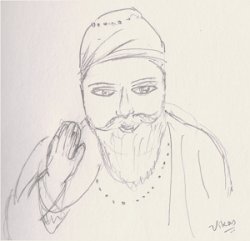Guru Nanak
by Jyotsna Kamat
First Online: September 01, 2004
Page Last Updated: December 07, 2024
Nanak was born in village Talavandi near Lahore (now in Pakistan known as
Nankana Sahib)
in undivided Punjab of Khatri (Kshatriya) parents. They were farmers and
Nanak's
father Kalu was the village accountant. Mother's name was Tripta. Nanak attended
the village school and learnt his native language Punjabi, Hindi, and Persian and
three 'R's. He started composing verses at a very young age and it is told that he composed
lines on the day of his Upanayana ceremony which runs like:
"Cotton is
kindness.
Contentment is the thread truth is the twisted length.
The knot represents
constraint.
This twisted thread was consecrated in the tire if self .
This
thread knows no destruction."
Nanak's strange ways as a child (deep meditation, other worldliness, love of solitude) disturbed his father who first tried to make him a farmer, then a trader. Nanak was found unsuccessful in both the vocations. Then his father purchased a few cattle to make his son self-supporting (Nanak was married early, as was the norm at that time). But lost in contemplation, he lost touch of the cows which entered the village fields and destroyed the crop. Finally he took to writing of accounts. He earned the goodwill of the ruler due to honesty and religious temperament. Here he required a lifelong companion and disciple Mardana who played Rabab (folk instrument) as Nanak composed and sang verses. Both spent their spare time in singing Bhajans.
© Vikas Kamat

Guru Nanak (1469-1538)
The call of the other world was getting strong. Nanak renounced his family (wife and two children) and set on a spiritual quest, accompanied by Mardana. He wandered throughout the country visiting holy places and meeting saints of different faiths. Those were times of religious awakening in the North as well as in the South. It is said that Nanak visited Mecca and had discussion with Muslim divines of Arab countries as well.
He returned to Punjab after twelve years of pilgrimage. But tradition ascribes fifty years of wandering. Babur had invaded India by then. Tradition records that he met Babur the Moghul emperor, and influenced him to treat his prisoners kindly. Babur wanted to present some gifts to him. When God is there to give everything what else can you offer me?" -- was the saint's blunt reply.
People of all faiths were drawn to his ascetic ways of compassion, his group prayers, and his service to the poor. Many offerings came as well, which were spent in distribution to the poor. He gave great importance to purity of heart than learning of scriptures, condemned the caste system and stressed simple life like taught by Kabir.
He believed in non-anthropomorphic god but called him Hari. He gave great importance to repetition of divine name (japa) and wrote a long poem Japji which every religious Sikh, recites in the morning. A few lines:
Of him, the one true name is Om!
Creator, all-pervading He,
Devoid of hate and fear, unborn,
undying, self-existent Lord.
True is the Lord, true is his name
If uttered with endless love
unceasingly men ask from Him
and from his hands receive rich
gifts.
Incognito, he went to a forest and prayed for three days and got revelation from formless God Almighty--O Nanak! I am Adi Brahma, your god. I have shown kindness (mercy) to you. So you also be kind to all beings! said the invisible voice.
"God is one! exclaimed Nanak. "His name is Truth. He is the creator. He is without birth or death. Self-incarnate." Nanak composed verses and sang about glories of God accompanied by Mardana on Rabab. Nanak lived and died as a saint worshipped by all communities. But soon after his death his followers under Guru Angad called themselves Sikhs ("Shishya" in Punjabi) later paving way to Sikhism, a new sect, apart from Hinduism, but absorbing many traits of Advaitism. As a guru he is worshipped in Punjab, Sindh and many parts of North India.
The town of Bidar in Karnataka has Nanakzara. When orthodox Hindus denied him water, he obtained spring water through Yogic powers. A guru-dwara has come up there which provides shelter to one and all irrespective of religion.
![]()
See Also:
Introduction | Important
Proponents | Pictures
Alvars | Shankara |Bridal Devotion | The
Alvars | Ramanuja | Madhva | Ravidas
Meerabai | Guru Nanak | Chaitanya | Purandaradas
Ramananda | Kabir | Tukaram | Kanakadas

